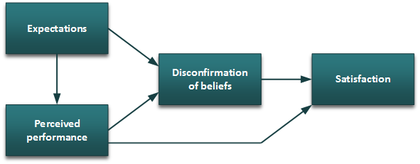
Expectation confirmation theory (or ECT) is a cognitive theory which seeks to explain post-purchase or post-adoption satisfaction as a function of expectations, perceived performance, and disconfirmation of beliefs. The structure of the theory was developed in a series of two papers written by Richard L. Oliver in 1977 and 1980.[1] Although the theory originally appeared in the psychology and marketing literatures, it has since been adopted in several other scientific fields, notably including consumer research and information systems,[2] among others.
- ^ Philip Gibson, Alexis Papathanassis, Petra Milde (2011). "Cruise Sector Challenges: Making Progress in an Uncertain World". Springer Science & Business Media. p. 7. ISBN 978-3-8349-6871-5. Retrieved 2023-03-01.
{{cite news}}: CS1 maint: multiple names: authors list (link) - ^ Bhattacherjee 2001.